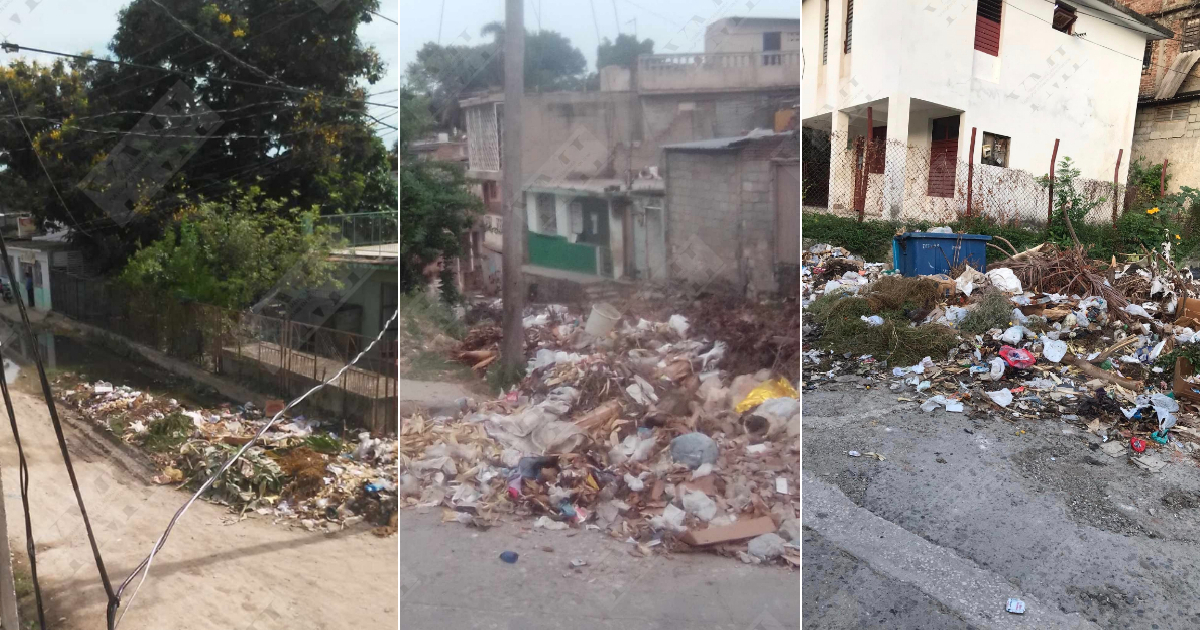Trash heaps are multiplying throughout the city of Santiago de Cuba, with authorities failing to address a worsening sanitary crisis marked by the outbreak of dengue and the Oropouche virus.
Numerous complaints from residents of the bustling city have come to light in recent hours, thanks to communicator Yosmany Mayeta, who has shared photographs on his digital platforms that highlight the grave situation.
Residents of the Altamira and Villalón neighborhoods have reported the unsanitary conditions where they live, attributing the issue to the accumulation of street garbage as the Empresa de Servicios Comunales fails to systematically collect waste.
On 7th Street in Altamira, residents complained about a massive garbage pile blocking drains and causing water to stagnate. "We are tired of the stench of dead animals and waste. No one bothers to collect the trash, even though the garbage pile is right next to a daycare center and the supermarket," said a young woman named Yuleydis.
According to her, at the corner of 7th and 10th Streets, "people dump dead animals, bags filled with pig intestines, and other solid waste from neighboring homes, along with branches and tree limbs pruned by residents." She also expressed concern about the clogged drains and stagnant water: "The mosquitoes are draining us, and I have complained to the Polyclinic about this epidemic hotspot, but no one comes. The puddle is just inches from the supermarket because the drains are clogged, and only Communales can fix it. Dengue can kill; it seems they are waiting for fatalities," she warned.
Less than two hours after this complaint, Communales officials arrived and cleaned the area, Mayeta reported in another post. However, residents of Comancié Street submitted another complaint about a garbage dump next to a family doctor's office, urging its prompt removal.
"It is inconceivable that if they enter a neighborhood to collect garbage, they don’t clean all the dumps, especially those affecting people and patients visiting a medical office," Mayeta emphasized.
Similar conditions affect residents and passersby on 2nd Street, Callejón de Gata, between Hermano Ducase and Santa Rita, in the Villalón neighborhood, a couple of blocks from the well-known San Agustín pizzeria. The person who sent the complaint stated that "it has been more than a month since Communales collected the massive garbage heap affecting the entire neighborhood." Despite complaints filed at the Ramón López Peña Polyclinic (the health area where the dump is located), health authorities have ignored the affected residents.
Mayeta called on government, public health, and Communales authorities from both the city and the province to resolve the issue immediately. In one of his posts, he recommended "placing plastic solid waste collection containers with lids, ensuring they are protected and maintaining a regular collection schedule to prevent micro-dumps and stagnant sewage puddles."
He urged the polyclinics' management in each area to "deploy health personnel to the streets," so they can "survey the dumps in their zones and ensure they are collected as quickly as possible." "The authorities in Santiago de Cuba want to eradicate the epidemic outbreaks severely affecting the population, but it is the leaders who are causing this epidemic to continue spreading," warned the communicator.
Mayeta also urged his followers to post photos and videos of the garbage dumps in their neighborhoods on social media this Thursday and Friday, to prompt authorities to clean up the trash contaminating the city. "Let's root out governmental indifference once and for all," he said, challenging the province's party first secretary, Beatriz Johnson, and governor Manuel Falcón to "fulfill their duty to lead effectively, or otherwise, step down from their public positions."
The numerous garbage dumps in Cuban cities have contributed to the rapid spread of epidemics like dengue and Oropouche this year. In May, residents of Santiago de Cuba alerted Mayeta about people suffering from high fevers and other symptoms that doctors could not identify, which were the first warning signs of the Oropouche virus in Cuba. It wasn't until days later that provincial authorities acknowledged the emergence of an unknown virus under investigation. By the end of that month, the Ministry of Public Health announced the first detection of Oropouche in the country.
Today, the disease is widespread throughout Cuba, and the population is at high risk of contracting it due to the authorities' failure to take timely containment measures or allocate necessary resources to eradicate the mosquitoes that transmit the virus. Following the arrival of Oropouche, the epidemiological situation on the island has worsened further with the presence of dengue, a disease that is already endemic in Cuba.
Key Issues Facing Santiago de Cuba's Sanitation Crisis
Here are some frequently asked questions and answers about the ongoing sanitation crisis in Santiago de Cuba, covering the role of authorities, health risks, and community actions.
What are the main causes of the sanitation crisis in Santiago de Cuba?
The crisis is primarily due to the failure of the Empresa de Servicios Comunales to systematically collect garbage, leading to severe accumulation of waste in residential areas.
How are the unsanitary conditions affecting public health?
The unsanitary conditions are contributing to the spread of diseases like dengue and the Oropouche virus, with stagnant water serving as breeding grounds for mosquitoes that transmit these illnesses.
What actions have been taken by authorities in response to the complaints?
While some immediate clean-up actions have been taken following public complaints, many areas remain neglected, and systemic issues persist.
What recommendations have been made to solve the garbage crisis?
Recommendations include placing protected solid waste collection containers with lids and maintaining a regular collection schedule to prevent waste accumulation and stagnant water.
How can residents contribute to improving the situation?
Residents are encouraged to post photos and videos of garbage dumps on social media to raise awareness and pressure authorities to take action, as well as to report unsanitary conditions to local health clinics and government offices.
